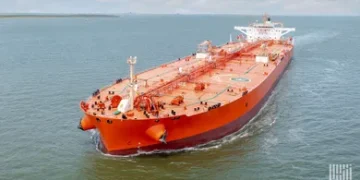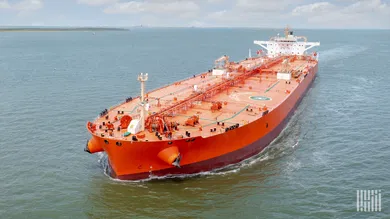By Maria Kalamatas | August 1, 2025
Muscat, Oman — It’s 02:00 a.m. aboard the MT Crystal Bay, and Captain Hassan doesn’t blink. He’s been awake for 17 hours, eyes locked on the radar, watching every pixel shift as the tanker crawls up the Arabian Sea. Not toward the Suez Canal — not anymore.
“Too risky,” he mutters. “Too many unknowns in those waters now.”
Instead of the traditional Red Sea passage, his vessel — like hundreds of others this month — is detouring around the Cape of Good Hope, adding 11 days to the journey and thousands of barrels of fuel to the budget.
Pirates, drones, and second thoughts
What began as a temporary avoidance strategy has now become semi-permanent for much of the global fleet. Houthi drone strikes and attacks on commercial vessels in the southern Red Sea have turned what was once a routine route into a high-risk gamble.
Shipping lines like Maersk, MOL, and Hafnia have either suspended transits or shifted tankers and bulkers onto alternative loops. The result? Congestion around South Africa, skyrocketing insurance premiums, and crews under immense mental strain.
“You used to set course and forget,” said First Officer Elena, speaking from the bridge. “Now we double-check everything — AIS signals, fishing vessels, weather, even false distress calls.”
Supply chains slow, margins bleed
According to data from Clarksons, average crude tanker voyage durations from the Middle East to Europe are up 23% since May. For refineries in Spain and France, that delay means lower throughput and tighter inventory buffers.
“It’s not just oil,” said Karl Dupuis, a maritime analyst in Rotterdam. “We’re talking chemicals, palm oil, LNG. Whole trade flows are rerouting, and every day added chips away at profit.”
Ports in Cape Town and Durban are reporting a 38% increase in inbound vessel calls compared to last year. But facilities weren’t built for this volume. Berths are full. Tugboat crews are exhausted.
No timeline in sight
Talks for a secure corridor in the Red Sea are ongoing, but shipping execs aren’t optimistic. “Even if naval escorts increase,” said a Singapore-based ship manager, “you can’t unshake the fear. And fear doesn’t file ETA reports.”
Back aboard the Crystal Bay, Captain Hassan sips coffee from a dented steel mug. He’s calculating distance, checking wind speeds. “We’ll get there,” he says quietly. “Just not the way we used to.”





















